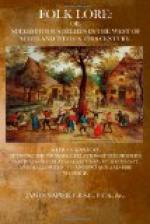Before reviewing the superstitious beliefs and practices of our immediate forefathers, we may, I think, profitably occupy a short time in gaining some general idea of the prominent features of ancient Pagan religions, for without doubt much of the mythology and superstitious practice of our forefathers had a Pagan origin. I shall not attempt any exhaustive treatise on this subject, for the task is beyond me, but a slight notice of ancient theology may not here be irrelevant. The late George Smith, the eminent Assyriologist, says:—
“Upwards of 2000 years B.C. the Babylonians had three great gods—Anu, Bel, and Hea. These three leading deities formed members of twelve gods, also called great. These were—
1. Anu, King of Angels and Spirits. Lord of the city Eresh.
2. Bel, Lord of the world,
Father of the Gods, Creator. Lord of the
city of
Nipur.
3. Hea, Maker of fate,
Lord of the deep, God of wisdom and knowledge.
Lord of
the city of Eridu.
4. Sin, Lord of crowns, Maker of brightness. Lord of the city Urr.
5. Merodash, Just Prince
of the Gods, Lord of birth. Lord of the
city Babylon.
6. Vul, the strong God,
Lord of canals and atmosphere. Lord of the
city Mura.
7. Shama, Judge of heaven
and earth, Director of all. Lord of the
cities of
Larsa and Sippara.
8. Ninip, Warrior of
the warriors of the Gods, Destroyer of wicked.
Lord of
the city Nipur.
9. Nergal, Giant King of war. Lord of the city Cutha.
10. Nusku, Holder of the Golden Sceptre, the lofty God.
11. Belat, Wife of Bel, Mother
of the great Gods. Lady of the city
Nipur.
12. Ishtar, Eldest of Heaven and Earth, Raising the face of warriors.
“Below these deities there were a large body of gods, forming the bulk of the Pantheon; and below these were arranged the Igege or angels of heaven; and the anunaki or angels of earth; below these again came curious classes of spirits or genii, some were evil and some good.”




